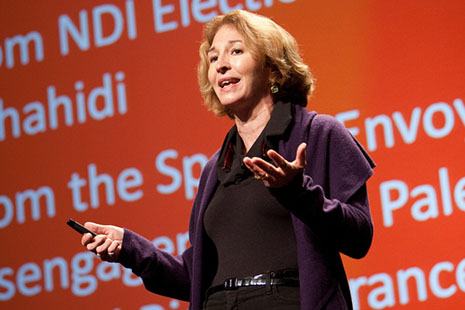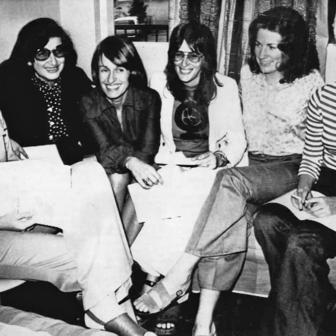ANNE-MARIE Slaughter’s recent role as director of policy planning for Hillary Clinton explains the viral attention her 12,000-word essay in the Atlantic has received over the past few weeks. An ex-colleague of a secretary of state, former dean of a big policy institute and law professor at Princeton is obviously going to be listened to. But this doesn’t explain the lightning response her essay is sparking the world over – including attracting a million-plus online readers.
Her essay, “Why Women Still Can’t Have It All,” has touched a nerve that, among women of a certain age and education, jangles at the slightest touch. For these women, the mere mention of work–life balance – and any hint of valuing family over professional advancement – puts them on the defensive. The concept of having it all, of fulfilling work and a happy family life, makes their ears prick up and look warily at each other. (I should know – I’m one of them.)
So great has been the impact of this essay that just keeping up with the responses has been, for Slaughter, equivalent to the high-powered White House position she recently left. Clearly there is something about the work–life debate that makes female columnists especially narky. In a 10 July opinion piece in the Australian Financial Review, Emma-Kate Symons let fly. Slaughter’s thesis is “skewed by upper-class pretensions… It’s anti-feminist, elitist and dangerous for women.” “Goodness,” I thought, “is she responding to the same essay I’ve just read?” And if “Why Women Still Can’t Have It All” were all that Symons says it is, would it really have been circulated the world over in a matter of days, and recommended on Facebook 168,000 times?
So what’s all the fuss about? The Atlantic essay describes at length Anne-Marie Slaughter’s change of heart on stepping down from her “dream job” in the White House. Within days of resigning she had, she realised, changed sides. One day she was held up as a high-powered exemplar of a successful work–life balance. The next day she was openly admitting to having – temporarily – toppled off it. No news there. As countless surveys attest, the women in the latter category far outnumber the women in the former.
“Millions of women,” she notes in her essay, “feel that they are to blame if they cannot manage to rise up the ladder as fast as men and also have a family and active home life (and be thin and beautiful to boot).” To respond to what she calls “the maternal imperative” at the same time as climbing the professional ladder in the shortest possible time is, she writes, to attempt to achieve incompatible goals.
Ultimately Slaughter is calling for a shift in professional culture towards a more flexible and compassionate attitude to family demands, one that would inject more give into a system that all but forces women to choose family over career in times of personal stress. In an interview with Der Spiegel in the wake of her essay, she summed it up this way: “We are making it impossible to pursue your ambition and be the parent that you must be and want to be.”
In some ways Slaughter is an unlikely advocate for this point of view. In Der Spiegel she freely admitted that she did academic work in her hospital bed just hours after giving birth, went back to work at three months, has always been the family’s primary wage earner, and has travelled constantly. Given all this, her rise to director of policy planning for Hillary Clinton – a role she coveted for decades – comes as no surprise.
The real irony is that the Atlantic chose to call her essay “Why Women Still Can’t Have It All” when in fact she insists that women can have it all, and that she has managed just that – though not at the White House. Yes, women can have a successful career and a happy home life, she suggests, on one condition. “I have always been able to have it all,” she told Der Spiegel, “but what I realised was that this was because, as a professor, I controlled my own time.”
Of course, most women in full-time work with children at home can’t control their work schedules – which means, according to this definition, that most women can’t have it all. These are precisely the women who have caused the avalanche in Anne-Marie Slaughter’s inbox. “In 95 per cent of the cases,” she told Der Spiegel, “the response is ‘Thank you.’ I am bowled off my feet. I knew that the cause was important, but I didn’t realise how many women feel they are struggling with trying to make it all happen – working around the clock and being there for their children.”
Not everyone agrees with her. Sheryl Sandberg, the second to the top at Facebook, recently admonished a younger generation of women not to take their feet “off the gas pedal.” You aren’t committed enough, she exhorted. This is a view, Slaughter points out, that assumes commitment is “a function of personal determination.” Or, in simple terms, that women struggling to reconcile work–life demands should “just try harder.”
Working women, says Slaughter, already try harder and work harder than they’ve ever done. “The lives that working women lead are equivalent to training for a marathon, and more, in terms of discipline and sheer will-power.” She should know – for two years she rose at 4.20 am each Monday for the train to Washington, returning late on Friday.
And so it was that, late one Sunday night in New Jersey, her ten-year-old son begged her in tears not to take the train to Washington the next morning. The sacrifice that she was asking him to make – to let her go so that she could work on behalf of the country – just didn’t wash. “I don’t care about the country,” was his flat reply. Realising that her son needed her more than her country did – that she was indispensable to him, but not to the State Department, and that her absence might be harming him at a deep level, led to her decision to rejoin Princeton’s law faculty before her tenure there expired. “I didn’t just need to go home,” she recalls, “I wanted to go home.”
On leaving her post in Washington – “increasingly aware that the feminist beliefs on which I had built my entire career were shifting under my feet” – she received two main reactions. The first, mainly from older women, was disappointment that such an important role model should be seen to retire from public life. The second response was curlier. “I wouldn’t generalise from your experience,” a colleague told her. “I’ve never had to compromise, and my kids turned out great.” It was the second reaction that she found the more hurtful – a “rude epiphany” that unleashed in her a “blind fury.”
The final trigger for Anne-Marie Slaughter’s Atlantic essay came not from anger but sympathy. She was asked to give a talk in Oxford about work–life balance to a large mixed group of bright young things. After she finished speaking a young woman came up and thanked her for “not giving just one more fatuous ‘You can have it all’ talk.” “The audience was rapt,” she noted. This talk led to several similar talks (she commonly gives forty to fifty a year), and at a dinner following one of these talks she chatted to a couple of young female lawyers who were discussing the dearth of legal role models who demonstrated a successful work–life balance. The only models they had, the two women complained, were women who “take two years off when their kids are young but then work like crazy to get back on track professionally, which means that they see their kids when they are toddlers but not teenagers, or really barely at all.” “Both were very clear,” she writes, “that they did not want that life, but could not figure out how to combine professional success and satisfaction with a real commitment to family.”
SLAUGHTER’s essay is long and demanding because the issues she tackles are just that. Critics have slated her for being elitist. But her campaign – to create a groundswell of support for more flexible and compassionate ways of working at a professional level – is directed at the whole of society, and not just her demographic (which she freely describes as “highly-educated, well-off women who are privileged enough to have choices in the first place”). Of course the critics are right – critics often are, to some extent. Most women will never hold a high-powered job in the rarefied atmosphere of the White House. They will never ask themselves, late on a Sunday evening as they pack for Washington, “Who needs me more, my family or my country?”
And yet, in another sense, Slaughter’s decision to leave the White House reflects every working mother’s struggle. “Who needs me more, my family or my work?” is a question that conceals a trickier question within it. “What do I need more, in my journey to be myself, my family or my work?” And it’s pointy questions like this one, Slaughter suggests, that weigh less heavily in the minds of fathers than in the minds of mothers.
It’s important to mention that Slaughter’s sons were ten and fourteen when she faced her crisis in Washington. They weren’t one and three, for instance – the age at which the Mummy Wars are commonly fought. The teenage years, she insists, are every bit as vital as the early years in terms of family relationships. Being available as a parent in the teenage years “is just as important as in the first years of a child’s life.” This, she observes, is a particular problem for ambitious women who are often “peaking at forty-five to fifty-five” – messily coinciding with their children hitting their teens.
In the second half of her essay, Slaughter unpacks the assumptions that are often rolled out to explain the professional success of women with children. It’s possible if you are committed enough. This is the cry of first wave feminists who feel let down by younger women’s less strident efforts. “What’s the matter with you?” they seem to be asking today’s less driven women. It’s possible if you marry the right person. This assumption is just as loaded. Not because it isn’t true – Anne-Marie Slaughter’s husband put in the lion’s share of her sons’ care – but because it’s the society you live in, as much as the man you marry, that keeps the work–life seesaw in balance. It’s possible if you sequence it right. This assumption has some force for Anne-Marie Slaughter – as a necessary but not sufficient condition for women to succeed in having it all. Besides, in her experience there is no sequence, no ideal timing for childbearing, that doesn’t involve a few trade-offs.
The career arc, as she draws it, looks rather different today from the way it looked in the mid twentieth century. Instead of having your kids in your twenties, staying in one job for your whole career, retiring at sixty-seven and dying at seventy-one, these days we can, she reckons, have children later, work until we’re seventy-five, have multiple jobs, and enter an “encore career” in our seventies. Assuming “health and fortune” are on our side, we might expect to enjoy a fifty-year career stretch that allows for a bit of “stair stepping” – or “putting money in the family bank” – during the middle years.
Slaughter still works at a high level for long hours at Princeton – she just no longer takes a plane to Washington to work. Yes, she makes a stand for more compassion and flexibility in the workplace, for school and work schedules to better coincide, and for all of us to talk openly about the most central relationships of our lives. But not for a minute does she suppose that any of this could ever be simple or easy. The strength of her essay is that it’s nuanced – dare I say balanced?
Halfway through the essay she stops her flow to cite an American study on happiness. Despite a narrowing gender gap at work, the study finds that the happiness levels among women in general has declined. “Women are less happy today than their predecessors were in 1972, both in absolute terms and relative to men.” On top of a wage gap, there is now a well-being gap, with women exhibiting more stresses than men. Perhaps this is what has got so many women talking.
In concluding, Slaughter makes a special plea. She would like society to value those women who, during periods of family stress, choose to value family over professional advancement. “If we really valued these choices, we would value the people who make them; if we really valued the people who make them, we would do everything possible to hire and retrain them; if we did everything possible to allow them to combine work and family over time, then the choices would get a lot easier.” But of course what she is really seeking, apart from a bit more give within society, is for we, as individual women, to value the choices that the maternal imperative compels us to make – which is a much a taller order. •




